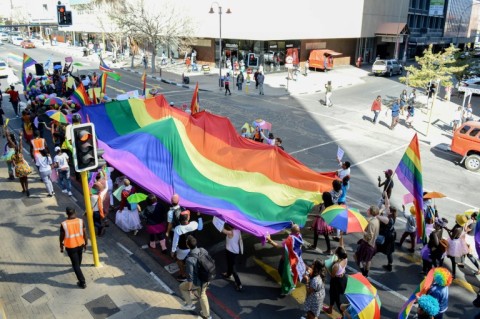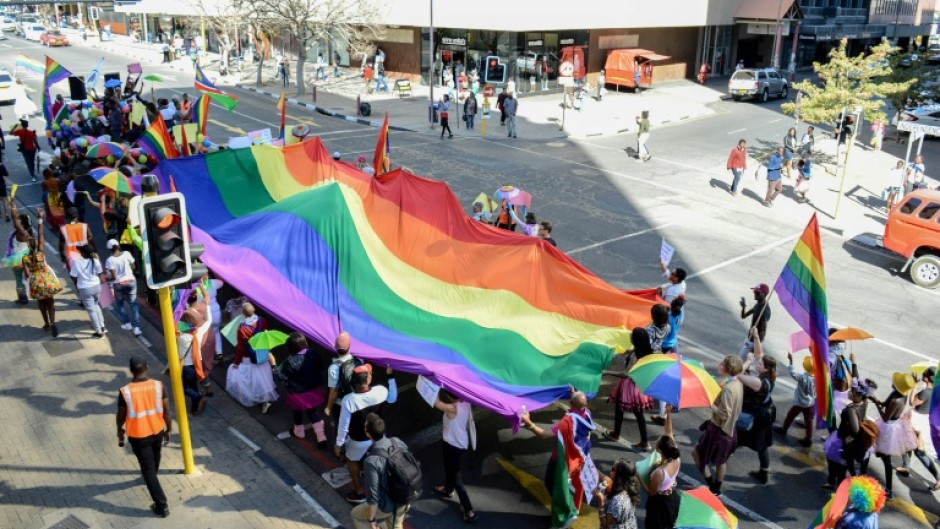
A top Namibian court on Friday struck down colonial-era laws criminalising same-sex relationships in a "historic" verdict against a pushback on LGBTQ rights in southern Africa.
The high court in the capital, Windhoek, declared the crimes of "sodomy" and "unnatural sexual offences" as "unconstitutional and invalid" in its ruling on the case brought by a local LGBTQ activist.
"We are not persuaded that in a democratic society such as ours... it is reasonably justifiable to make an activity criminal just because a segment, maybe a majority, of the citizenry consider it to be unacceptable," the judges wrote.
The judgement overturns rarely enforced laws dating back to 1927, which Namibia inherited from the colonial era but maintained after gaining independence from South Africa in 1990.
"Because of this decision, I no longer feel like a criminal on the run in my own country simply because of who I am," Friedel Dausab, the activist who brought the case, said in a statement.
"It is a beautiful day for our democracy, our country and our constitution," he added to AFP.
London-based Human Dignity Trust, a non-profit organisation that supported the legal case, called the ruling "historic", saying it struck down laws that enabled stigma and discrimination.
"LGBT Namibians can now look to a brighter future," said its chief executive, Tea Braun.
Justice ministry representative Gladice Pickering, said the government was considering the judgment and had no comment at this time.
- 'Backlash' -
Photos shared online by local rights group Equal Namibia showed people inside the courtroom hugging after the verdict was handed down.
Dozens of activists stood outside holding placards and banners reading "Decolonise-MySexuality" and "Get the Law out of my love life".
The ruling represents the latest court victory for the Namibian LGBTQ community. Namibia has seen a flurry of cases on the rights of same-sex couples to marry, become parents and immigrate in recent years.
Last year, the Supreme Court said that same-sex marriages contracted abroad between Namibian citizens and foreign spouses should be recognised.
But that ruling enraged social conservatives in the sparsely populated, largely Christian nation, a popular tourist destination rich in wildlife and natural attractions.
In response, lawmakers approved new laws to ban same-sex marriage and punish its supporters. It is awaiting ratification from the president.
Omar van Reenen, of Equal Namibia, said there were fears that the latest veridic would also draw a harsh response.
"We were not worried about whether we would win or lose, but about the backlash from political leaders... and the religious extremists," he said.
- 'Significant victory' -
Amnesty International said it documented "alarming rhetoric" in the run-up to the ruling "threatening the rights of LGBTI persons".
"The authorities must ensure the safety of LGBTI persons in Namibia and hold accountable anyone who violates their rights," said Khanyo Farise, the group's deputy regional director for east and southern Africa.
While a handful of African countries have legalised same-sex relationships, South Africa remains the sole African nation which allows gay marriage, legalised in 2006.
Legal efforts to improve LGBTQ rights have drawn protests also in neighbouring Botswana and Malawi over the past year.
In Namibia, the high court has jurisdiction over constitutional matters. Its decisions can be appealed before the Supreme Court.
The United Nations AIDS programme, UNAIDS, said the latest judgment marked a "significant victory for equality and human rights".
"This decision... is a powerful step towards a more inclusive Namibia," said Anne Githuku-Shongwe, UNAIDS regional director for East and Southern Africa.
"The colonial-era common law that criminalised same-sex sexual relations perpetuated an environment of discrimination and fear, often hindering access to essential healthcare services for LGBTQ+ individuals."
str-zam-ub/ach
By Jemima Beukes

